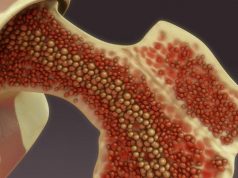The 60th American Society of Hematology Annual Meeting and Exposition
The annual meeting of the American Society of Hematology was held from Dec. 1 to 4 in San Diego and attracted approximately 22,000 participants from around the world, including hematology specialists, clinical practitioners, and other health care professionals. The conference featured presentations focusing on the diagnosis, treatment, and prevention of disorders affecting blood and bone marrow, as well as the immunologic, hemostatic, and vascular systems.
In one study, Mitchell Cairo, M.D., of the New York Medical College in Valhalla, and colleagues developed a novel, modified stem cell transplantation technique for sickle cell disease (SCD) that uses a cellular engineering approach to augment a parent’s bone marrow, therefore making it more effective for transplant.
“This study was born from the desire to improve the treatment options available to patients living with SCD. Currently, the only curative therapy for SCD is an allogeneic transplant from a non-sickle cell, tissue-matched sibling, yet only one in six SCD patients find a suitable brother or sister with a tissue match,” Cairo said. “As a result, today, approximately 85 percent of patients are unable to find suitable donors. While previous studies have looked at using alternative stem cell donors, such as unrelated donors or unrelated cord blood donors, these studies failed to be effective.”
In this study, the investigators performed transplants in 19 patients, age 3 to 20 years, with frequent or severe SCD symptoms, including 15 patients who received a transplant from their mothers and four who received a transplant from their fathers.
“Two years after the transplant, we found that the patients experienced improved cardiovascular and neurological function as well as demonstrated improvements in health-related quality of life and were considered stable. The findings suggest that 90 percent of patients will go on to lead normal lives,” Cairo said. “This approach could potentially change the treatment of sickle cell disease and provide patients with the disease a viable and highly effective stem cell transplantation treatment option.”
In another study, Jennifer A. Woyach, M.D., of The Ohio State University Comprehensive Cancer Center in Columbus, and colleagues found that ibrutinib is the most effective agent in the treatment of chronic lymphocytic leukemia in older patients.
“This is a phase 3 trial of bendamustine/rituximab versus ibrutinib versus ibrutinib/rituximab in previously untreated older patients with chronic lymphocytic leukemia, designed to help inform standard of care in this patient population,” Woyach explained.
The investigators demonstrated that progression-free survival is significantly longer with ibrutinib or ibrutinib/rituximab versus bendamustine/rituximab. There was no difference between ibrutinib and ibrutinib/rituximab.
“We did not have an overall survival difference, likely due to crossover design, competing risks of death in this patient population, and relatively short follow-up for this end point,” Woyach said. “Ibrutinib is already approved by the U.S. Food and Drug Administration in the frontline setting, but these data give support to use in this population versus standard chemoimmunotherapy.”
Several authors disclosed financial ties to pharmaceutical companies, including Pharmacyclics, which manufactures ibrutinib and partially funded the study.
As part of the Beat AML (acute myeloid leukemia) trial, Amy Burd, Ph.D., the vice president for research strategy at the Leukemia & Lymphoma Society in Rye Brook, New York, and colleagues aimed to determine the feasibility of rapidly completing a genomic analysis within seven days of diagnosis and matching a patient to a novel targeted therapy.
“We’ve achieved our primary end point: 95 percent of patients were assigned to treatment within seven days; about half of them went on to be treated with the therapy they were assigned to,” Burd said. “The others have either decided on a different treatment option, went into a different clinical trial, opted for standard of care, declined to have treatment, or didn’t enter one of the study arms for a variety of reasons.”
Of the 356 patients who entered the trial, the investigators noted that 66 turned out to have something other than AML, 285 had their genomic screening performed, 273 had the information turned around within seven days and were assigned to treatment, 12 did not have their genomic profile completed within the seven days, and 146 went on to receive treatment in one of the study arms.
“We have seen in just the past year a remarkable number of targeted therapies approved for AML (nine) after decades of no new options for patients. With so many new therapies, it is more important than ever for physicians to get their patients’ subtypes of AML identified as rapidly as possible so they can be matched to a therapy that is most appropriate for them,” Burd said. “Getting a genomic analysis is becoming more important than ever and is a critical step in helping the doctor and patient make an appropriate treatment decision.”
ASH: Rivaroxaban Prevents Blood Clots in At-Risk Cancer Patients
WEDNESDAY, Dec. 5, 2018 (HealthDay News) — Rivaroxaban can prevent venous thromboembolism in cancer patients at increased risk, according to a study presented at the annual meeting of the American Society of Hematology, held from Dec. 1 to 4 in San Diego.
Abstract
Press Release
More Information
ASH: A+CHP Bests CHOP for Peripheral T-Cell Lymphoma
WEDNESDAY, Dec. 5, 2018 (HealthDay News) — For patients with CD30-positive peripheral T-cell lymphoma, brentuximab vedotin, cyclophosphamide, doxorubicin, and prednisone is superior to cyclophosphamide, doxorubicin, vincristine, and prednisone, according to a study published online Dec. 3 in The Lancet to coincide with the annual meeting of the American Society of Hematology, held from Dec. 1 to 4 in San Diego.
Abstract
Abstract/Full Text (subscription or payment may be required)
More Information
ASH: Ibrutinib Tops Bendamustine + Rituximab for CLL
MONDAY, Dec. 3, 2018 (HealthDay News) — For older patients with untreated chronic lymphocytic leukemia, treatment with ibrutinib alone or in combination with rituximab is associated with improved progression-free survival versus bendamustine plus rituximab, according to a study published online Dec. 1 in the New England Journal of Medicine. The research was published to coincide with the annual meeting of the American Society of Hematology, held from Dec. 1 to 4 in San Diego.
Abstract/Full Text
More Information
ASH: High Response to Tx After Checkpoint Blockade in NHL, HL
MONDAY, Dec. 3, 2018 (HealthDay News) — For heavily pretreated patients with relapsed/refractory non-Hodgkin lymphoma or Hodgkin lymphoma, response rates are high for treatment subsequent to checkpoint blockade therapy, according to two studies presented at the annual meeting of the American Society of Hematology, held from Dec. 1 to 4 in San Diego.
Press Release
More Information
Copyright © 2018 HealthDay. All rights reserved.







